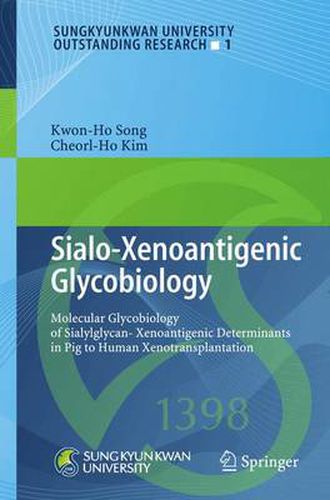Readings Newsletter
Become a Readings Member to make your shopping experience even easier.
Sign in or sign up for free!
You’re not far away from qualifying for FREE standard shipping within Australia
You’ve qualified for FREE standard shipping within Australia
The cart is loading…






This title is printed to order. This book may have been self-published. If so, we cannot guarantee the quality of the content. In the main most books will have gone through the editing process however some may not. We therefore suggest that you be aware of this before ordering this book. If in doubt check either the author or publisher’s details as we are unable to accept any returns unless they are faulty. Please contact us if you have any questions.
Carbohydrate antigens on glycoconjugates of mammalian cells play crucial roles in various biological processes and are epitopes recognized by the immune system, as glycobiology has hugely been progressed during the past two decades. The book focuses on sialic acid-based xenoantigenes. In pig to human xenotransplantation, exposure of pig organs to human blood results in hyper acute rejection (HAR), caused by differences in carbohydrate epitopes between human and pig vascular endothelia. Although Gal-antigen as major antigen was eliminated, the remaining non-Gal antigens are considered to be xenoantigens. Sialosyl-Tn or Hanganutziu-Deicher (HD), are non-Gal antigens specific to natural antibodies in human. To overcome rejection responses such as HAR, studies of genes involved in carbohydrate antigens, causing xenoantigenicity, are necessary. Knowledge of pig glycosyltransferases are also useful to apply to xenoantigen masking or identification of the xenoantigenic sialylglycan(s). In the first chapter the screening for pig glycosyltransferase genes for xenoantigens is presented. In the chapter II to IV the cloning, characterization, and investigation of the regulatory mechanism of the pig CMAH gene in NeuGc biosynthesis is shown. Lastly, the effects of an alteration of pig glycosylation patterns on human serum-mediated cytotoxicity, caused by human sialyltransferases including hST6GalNAc IV is presented.
$9.00 standard shipping within Australia
FREE standard shipping within Australia for orders over $100.00
Express & International shipping calculated at checkout
This title is printed to order. This book may have been self-published. If so, we cannot guarantee the quality of the content. In the main most books will have gone through the editing process however some may not. We therefore suggest that you be aware of this before ordering this book. If in doubt check either the author or publisher’s details as we are unable to accept any returns unless they are faulty. Please contact us if you have any questions.
Carbohydrate antigens on glycoconjugates of mammalian cells play crucial roles in various biological processes and are epitopes recognized by the immune system, as glycobiology has hugely been progressed during the past two decades. The book focuses on sialic acid-based xenoantigenes. In pig to human xenotransplantation, exposure of pig organs to human blood results in hyper acute rejection (HAR), caused by differences in carbohydrate epitopes between human and pig vascular endothelia. Although Gal-antigen as major antigen was eliminated, the remaining non-Gal antigens are considered to be xenoantigens. Sialosyl-Tn or Hanganutziu-Deicher (HD), are non-Gal antigens specific to natural antibodies in human. To overcome rejection responses such as HAR, studies of genes involved in carbohydrate antigens, causing xenoantigenicity, are necessary. Knowledge of pig glycosyltransferases are also useful to apply to xenoantigen masking or identification of the xenoantigenic sialylglycan(s). In the first chapter the screening for pig glycosyltransferase genes for xenoantigens is presented. In the chapter II to IV the cloning, characterization, and investigation of the regulatory mechanism of the pig CMAH gene in NeuGc biosynthesis is shown. Lastly, the effects of an alteration of pig glycosylation patterns on human serum-mediated cytotoxicity, caused by human sialyltransferases including hST6GalNAc IV is presented.